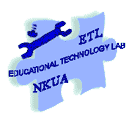

Film Collection > Plenary Talks
Agent-Based Modeling and Complex Systems Concepts as Useful Prior Knowledge in Secondary School Science Students’ Understanding of Evolution Scheintaub, H., Klopfer, E. and Wendel, D. |
(click here to watch the video) | |
We have shown that agent-based modeling and complex systems concepts can be practical and effective tools for middle school science and high school physics learning (Klopfer, 2009). This study builds on that experience, extending the use of agent-based models and complex systems simulations from the physical sciences to the secondary school biology curriculum. To this end, we designed and implemented a sequence of interactive off-computer and agent-based model building activities that would enable students to experience and experiment with the mechanisms that drive the emergence of large-scale global phenomena from smaller scales of agent actions and interactions. By including the act of model building (in many cases through computer programming) in the learning experience, students were able to participate in the full spectrum of interactions with simulations (Klopfer, 2009). Our objective here was to determine whether these modeling activities would provide the right prior knowledge (Schwartz, 2007), that when coupled with appropriate scaffolding and learning resources, would help students overcome misconceptions and build a robust understanding of evolutionary processes
|
 |
Hosted by Educational Technology Lab @ National and Kapodistrian University of Athens |